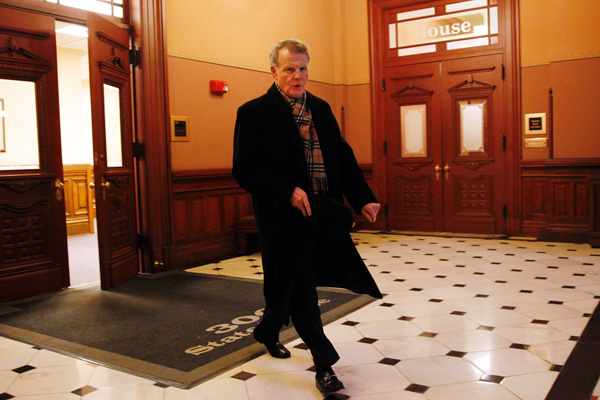
Photo: Chris Walker/Chicago Tribune
Michael Madigan
An interesting thing happened on the way to not passing pension reforms in the Illinois legislature. Basically, there are two bills: one from Senate leader John Cullerton and one from House leader Michael Madigan (Adam Doster had a good explainer on that when he was filling in for me). One can't pass the House. The other can't pass the Senate. Cullerton's bill is more likely to pass muster with the Illinois Supreme Court, and might even dodge a lawsuit—but probably not—since it has some labor buy-in. Madigan's bill would probably save much more money, but it's less likely to be constitutional, and would certainly be subject to a lawsuit from labor.
So it's not crazy that it didn't pass, exactly. Proponents of the House bill think we need all the cuts therein. Proponents of the Senate bill think the House bill is inevitably doomed, so the cuts aren't real and would add both a lengthy legal challenge on top of a delay in implementing pension cuts. These are non-trivial issues, and it took a good year or two get from a big menu of multiple bills and lots of different proposals to two competing proposals.
Given the near inevitability that Madigan, Cullerton, and Pat Quinn couldn't nail this down during the legislature's end-of-term cram session, there was an interestingly elegant solution: pass both! No, really. The Madigan plan would have taken precedence, and if that got killed by the court, then the Cullerton plan would kick in. The State-Journal Register's Chris Wetterich, who did some great work on pensions before heading for a job in Cincinnati, noted that Cullerton actually proposed this idea:
At the end of the 97th General Assembly, Cullerton suggested a compromise that would send both bills to the justices. He would allow Nekritz-Cross—which, among other things, imposed a five-year cost-of-living freeze, eliminated COLAs on pension income above $25,000 and increased employee contributions—to be “Part A” of the bill. The court would have to consider its constitutionality. If the justices determined it was OK, it would go into law.
There's some good explanation of how there's precedent for doing that sort of thing, and Tom Cross's concerns about how it might not work as intended. (That was the Nekritz-Biss bill, but as Cullerton pointed out a couple weeks ago, it's similar to Madigans and he'd be okay with the same idea.)
In short, there's no compromise bill for pension reform in the legislature, in terms of a bill that combines two sides that might be impossible to reconcile. There was, however, movement towards compromising by sending both plans to the Court. Cullerton explained what happened next to the Sun-Times:
If you go back and look at the Senate Bill 1 that I introduced, it had two parts. It had both bills in the same one, and the one that the House passed was primary. And I sponsored it and wanted that to go to a court. And if, and only if, they threw it out would they have to look at the back-up. And Ty Fahner and the Tribune editorial board and the Republicans who said they would be for that came off the bill. And I didn't have enough votes because, of course, the unions were against it. So congratulations business community, who now want me to only call the first part of the bill and not the second part even though the second part, the one that we passed, had a three-fifths vote.
Cullerton's latest statement on pension reform: "I don't know. I've tried everything." Including an everything bill, which didn't work, either.



